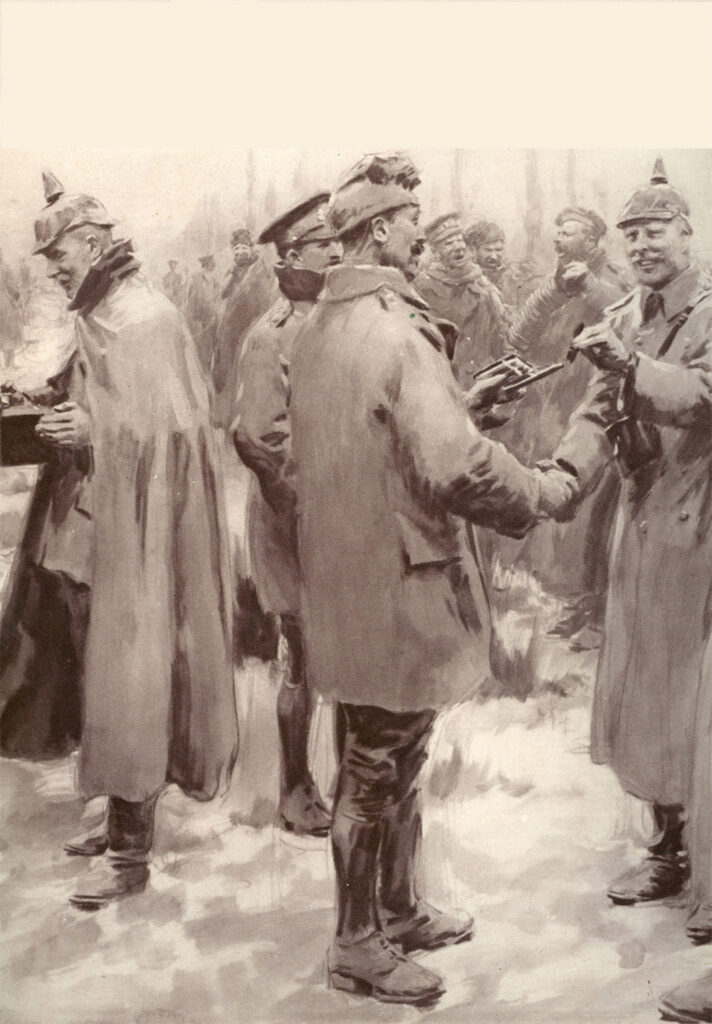Christmas 1915: A Silent Night on the Western Front
Related Articles: Christmas 1915: A Silent Night on the Western Front
- Christmas: A Time Of Joy And Reflection
- The Allure Of The Blue Christmas Tree: A Timeless Holiday Tradition
- The Ultimate Christmas Playlist For 2024: A Symphony Of Festive Delights
- Christian Cinema: A Glimpse Into The Future Of Faith-Based Films In 2024
- The Most Enchanting Christmas Songs Of 2024
Introduction
In this auspicious occasion, we are delighted to delve into the intriguing topic related to Christmas 1915: A Silent Night on the Western Front. Let’s weave interesting information and offer fresh perspectives to the readers.
Table of Content
Video about Christmas 1915: A Silent Night on the Western Front
Christmas 1915: A Silent Night on the Western Front

Amidst the deafening roar of artillery and the relentless carnage of the Great War, a flicker of hope emerged on Christmas Eve 1915. Along the Western Front, a spontaneous ceasefire took hold, allowing weary soldiers from both sides to experience a brief respite from the horrors of trench warfare.
As darkness enveloped the battlefields, the thunderous bombardment ceased, replaced by an eerie silence. Soldiers cautiously emerged from their dugouts, their hearts pounding with a mixture of trepidation and anticipation. On the British side, Lieutenant Colonel Geoffrey Heinekey wrote in his diary: "This is the most extraordinary thing I have ever experienced."
Slowly but surely, soldiers began to venture into no-man’s land, the desolate strip of territory between the opposing trenches. They approached each other cautiously, their weapons lowered. At first, they exchanged wary glances, but as they drew closer, a remarkable transformation occurred.
Smiles replaced suspicion, and laughter filled the air. Men who had been sworn enemies just hours before shared cigarettes, exchanged gifts, and sang carols. The Christmas spirit had triumphed over the brutality of war.
The ceasefire was not universally observed, and some fighting continued in certain sectors. However, in many areas, the truce held firm throughout Christmas Day. Soldiers played soccer, shared food and drink, and even held impromptu concerts.
One of the most poignant stories from that extraordinary day was the "Christmas Truce Carol," written by a British soldier named Alfred Anderson. The song captured the essence of the ceasefire, expressing the hope for a better future:
"The guns are silent on the Western Front,
The bells of peace are ringing in our hearts.
We’ll meet again on Christmas Day,
When the war is over and we’re home again."
The Christmas Truce of 1915 was a brief but profound moment of humanity amidst the unimaginable horrors of war. It demonstrated that even in the darkest of times, the human spirit can prevail.
The Origins of the Ceasefire
The precise origins of the ceasefire are unclear, but it is believed to have been initiated by German soldiers. In the days leading up to Christmas, German troops had been singing carols and decorating their trenches with Christmas trees. On Christmas Eve, they began to call out to the British soldiers, wishing them a Merry Christmas.
The British soldiers were initially hesitant, but eventually they responded in kind. As the singing continued, a sense of camaraderie began to grow between the two sides.
In some sectors, soldiers even ventured into no-man’s land to exchange gifts and sing carols together. The truce gradually spread along the Western Front, although it was not universally observed.
The Reaction of the High Command
The high commands of both the British and German armies were furious when they learned of the ceasefire. They feared that it would undermine morale and make it more difficult to resume fighting.
Orders were issued for the truce to be broken, and in some areas, soldiers were threatened with severe punishment if they disobeyed. However, in many sectors, the soldiers ignored the orders and continued to observe the ceasefire.
The Legacy of the Christmas Truce
The Christmas Truce of 1915 remains one of the most iconic and poignant events of the Great War. It demonstrated that even in the midst of unimaginable suffering, humanity can prevail.
The truce has been commemorated in countless books, films, and songs. It has also inspired peace movements and calls for an end to war.
In 2014, the centenary of the Christmas Truce was marked by a series of commemorative events around the world. These events included concerts, exhibitions, and educational programs.
The Christmas Truce of 1915 continues to serve as a reminder of the power of hope and the importance of peace. It is a story that should be told and retold for generations to come.
Additional Details and Anecdotes
- In some sectors, the ceasefire lasted for several days, allowing soldiers to play soccer, exchange letters, and even hold religious services together.
- One German soldier wrote in his diary: "We had a wonderful Christmas Eve. We sang carols and exchanged gifts with the English soldiers. It was like a dream."
- A British soldier recalled: "We sang carols and played games. It was like being back home for Christmas. For a few hours, we forgot that we were at war."
- The Christmas Truce was not universally observed. In some sectors, fighting continued throughout Christmas Day.
- The high commands of both the British and German armies were furious when they learned of the ceasefire. They feared that it would undermine morale and make it more difficult to resume fighting.
- Orders were issued for the truce to be broken, and in some areas, soldiers were threatened with severe punishment if they disobeyed. However, in many sectors, the soldiers ignored the orders and continued to observe the ceasefire.








Closure
Thus, we hope this article has provided valuable insights into Christmas 1915: A Silent Night on the Western Front. We appreciate your attention to our article. See you in our next article!